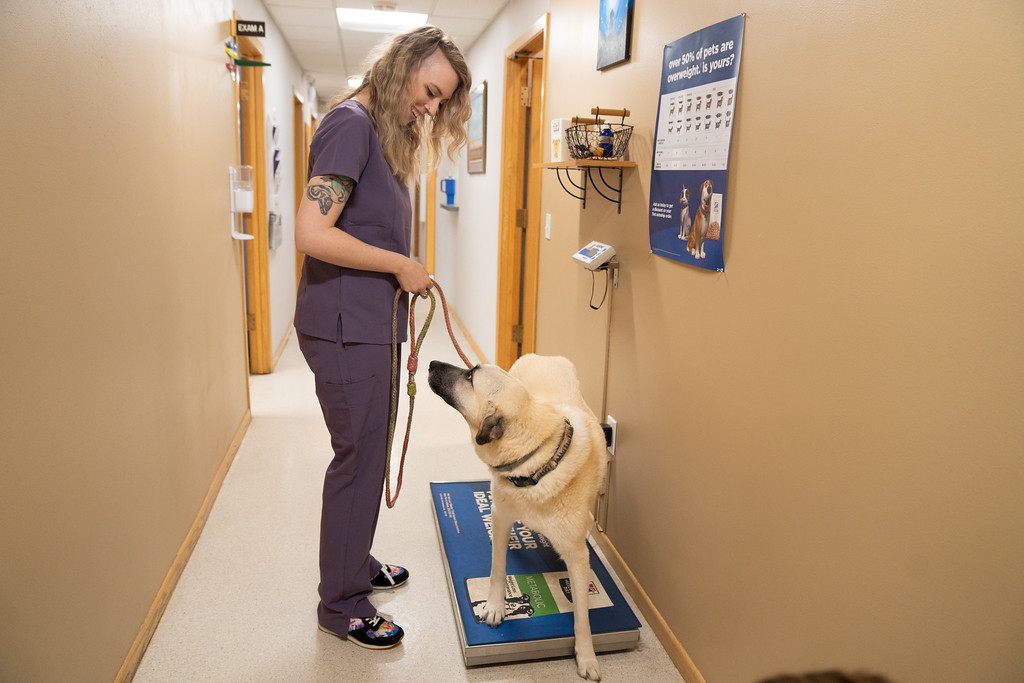
With retirement on the horizon, veterinarians John Dally, Ann Vetter and Mark Baenen wondered what would become of the two Wisconsin clinics they co-owned. They hoped Spring Green Animal Hospital and Mazomanie Animal Hospital would continue to serve future generations of pets, but they knew that many younger veterinarians don’t have the desire or financial capacity to take over an established practice. At the same time, they were troubled by the trend of corporations buying up independent veterinary practices nationwide.
Then Dally suggested they convert to a worker-owned cooperative. “It just made intuitive sense to me,” he said. “You can become an owner with minimal financial risk, and you get to have a say in your job.”
In late 2021, Dally reached out to Extension’s UW Center for Cooperatives (UWCC) to explore whether the model could work for their business. UWCC is the oldest university-based center in the United States dedicated to supporting cooperative businesses.
In January 2023, the business became Cooperative Veterinary Care. It is believed to be the first worker cooperative veterinary practice in the country — and the co-op’s members hope their journey inspires others to take this less-traveled path to business sustainability.



A practical succession plan
The veterinary medicine field has changed dramatically in recent years. As people invest more time and money in their animal companions, private equity firms have recognized the profit potential in the neighborhood vet clinic — a relatively recession-proof business. While veterinary practices have traditionally been owned by the veterinarians who work there, an estimated 25% of vet clinics nationwide are now corporate-owned, a number that is expected to reach 60% in the next decade.
For many independent veterinarians, the lucrative purchase offers from giant corporations are too alluring to resist. But Dally, Vetter and Baenen didn’t like the idea of eventually selling the practice they’d lovingly built to an out-of-state corporation.
That was a relief to Eric Howlett, a newer veterinarian on staff. Before joining Mazomanie Animal Hospital, Howlett worked in a corporate-owned practice. He thinks the profit-driven pressures are a key factor in the veterinary field’s high burnout rate.
“I saw how awful that environment was,” he said. “There was pressure on veterinarians to see more patients. They weren’t trying to tell us to change our medicine, but there was definitely a lot of pressure on support staff to become salespeople, and nobody got into this business to sell things.”
Some retiring veterinarians don’t even have the corporate buyout option. Corporate consolidators are typically interested in larger practices, leaving smaller, rural clinics to close if they can’t find another buyer. That’s why the founders of Spring Green Animal Hospital acquired the Mazomanie clinic in 2020 — to help out a colleague who wanted to retire and to make their own business more desirable when it was time to sell. Vetter had already been forced to close her own clinic in Madison when she couldn’t find anyone willing to take it over.
“That’s really been the driving force behind our coop idea — to have these businesses, instead of closing, stay in these communities and offer the same level of care,” Vetter said.
The challenges facing the veterinary medicine field aren’t unique. The coming retirement wave from Baby Boomers has been dubbed the “silver tsunami.”
“The number of small businesses that are at this point of succession is huge,” said Kristin Forde, a UWCC cooperative development specialist. “And the majority of small business owners don’t actually have a succession plan.”
Converting to a co-op can be a win-win for everyone, she noted.
“Selling to employees is a sure way to both preserve the legacy of the business owner and jobs,” Forde said. “And for employees, it takes on a whole lot more meaning when they’re at the decision-making table, and they’re benefiting from it financially as well. Also, worker co-ops have been shown to perform higher on certain metrics, like employee retention and being more resilient during an economic downturn.”

Becoming a co-op
But you can’t convert an existing business to a co-op overnight. First, UWCC talked to the vet clinics’ employees to explain how a worker cooperative works. Next, the business owners applied for a grant from Wisconsin Economic Development Corporation to fund a feasibility study conducted by an outside firm.
Once they had an estimate of the business’s value, they needed to find a way for the employees to buy it. That can be challenging for a high-value business because small business loans often require a personal guarantee, though there are lenders that specialize in working with cooperative businesses. Ultimately, Dally, Vetter and Baenen decided to finance the sale themselves because they were so committed to the co-op concept.
But there was more to figure out than just the finances. Guided by UWCC staff, a steering committee of 14 employees got to work drafting bylaws and determining co-op membership requirements, board composition, redistribution of profits, and more.
“They really wanted to set a price for membership stock that was affordable and accessible for all employees,” Forde said. To make the amount meaningful and yet attainable for everyone, they set up a payroll deduction option. The group also decided that profit-sharing distributions (called patronage in the co-op world) would be based on hours worked and not job position — meaning that a full-time kennel worker could receive just as much of the profits as a full-time veterinarian (though salaries still vary).
“It said that everybody’s time is valuable and each of us contributes to the success of this entity in different ways, and I love that,” Dally said. “That made me feel really good.”
Week after week, Forde and UWCC Director Courtney Berner walked the steering committee, then the 17-member board of directors through the process of working in a very different way from what they were used to. Employees were amazed when they all agreed or when they changed their mind after a spirited discussion.
“We all get chances to voice our opinions, from veterinarians to kennel workers,” Dally said. “And that takes time and it’s painful. But everyone feels like they at least were heard, and they understand why a decision was made, versus the top down approach that would happen in any other business.”
During one memorable meeting, Berner spontaneously suggested, “All in favor, say woof!” Without hesitation, the co-op members woofed like their canine patients. Since then, it’s become a tradition to cast votes with animal noises, including meows, moos and neighs.
An attorney and accountant helped with the necessary paperwork, and by January 2023, the group was officially incorporated as Cooperative Veterinary Care.
Adjusting to a new work model
UWCC’s support continued even after incorporation. Forde meets regularly with Howlett, the new board president, to help him navigate through any co-op issues. UWCC also offered trainings on topics such as financial literacy — helping staff who are more used to complex health procedures also understand how to read a profit and loss statement.
For Cooperative Veterinary Care, it’s a culture change that’s still in progress. “There still are these longstanding sorts of cultural dynamics in a workplace that take some time to shift,” Forde said.
But Howlett said he’s noticed an increased sense of camaraderie and motivation amongst the staff. “There has been a subtle shift over this year to people seeing themselves as part of a bigger whole in a way that is not fully transitioned yet,” he said. “But I think the seeds have been sown, and we’re starting to reap those benefits.”
That includes financial benefits. “Financially, we are more profitable than we’ve ever been,” Dally said. “All of a sudden, when people had their own interests at stake, they changed their behaviors in ways that made the business more profitable — like offering to do something that might take more time and effort, but it benefits the business and the pet and the owner because it provides a better outcome.”
For Dally, bringing democracy to his workplace might be the legacy he’s most proud to leave behind. “I would like to have a monetary reward for the years of effort I put into this business, but I also want to do something good in the world, and this was something I had to offer,” he said. “The fact that it seems to be working out a year in makes me very happy.”
Curious about co-ops? Explore the resources at uwcc.wisc.edu and reach out to UWCC staff to see how the co-op model might benefit your business.



